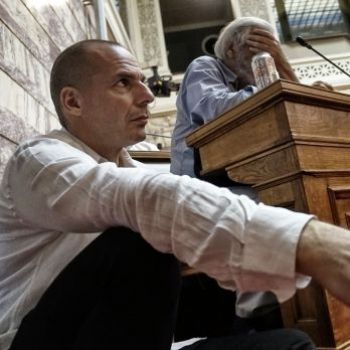

10 years ago
48
Why are the Greeks celebrating, ask baffled Germans
German newspapers and MP condemn Greek public’s jubilant reaction to referendum result that leaves “no more basis for cooperation with Greece in the eurozone”
Continue Reading-
July 6
-
Minister No More! By Yanis Varoufakis
The referendum of 5th July will stay in history as a unique moment when a small European nation rose up against debt-bondage. -
10 Consequences of Greece's 'No.' By Mohamed A. El-Erian
By heeding their government's advice and voting "No" in the referendum on Sunday, Greek citizens sent an unambiguous message. Much like the fictional Americans portrayed in the movie "Network" who threw open their windows and shouted out... -
German conservatives are destroying Europe with austerity, says economist Thomas Piketty
German conservatives are on course to destroy Europe with their commitment to continent-wide austerity, one of the world’s most influential economists has said... -
How a “Yes” minority supports a “No” majority to bring a new MoU to Greece
-
Europe Wins. By Paul Krugman
Tsipras and Syriza have won big in the referendum, strengthening their hand for whatever comes next. But they’re not the only winners: I would argue that Europe, and the European idea, just won big — at least in the sense of dodging a bullet... -
Merkel, Hollande to Determine Europe Response to Greek ‘No’
German Chancellor Angela Merkel will travel to Paris on Monday for talks with French President Francois Hollande to map out the way forward for Greece after voters upended more than five years of crisis-fighting by rejecting creditors’ terms for rescue aid... -
The week that Germany turned its back on Greece
After trust between the two broke at a key moment, the Telegraph travels to Frankfurt and Berlin to ask those in the know what will – or should – happen next -
July 5
-
Greece news live: Banks to remain shut for another two days as creditors squeeze country after No vote
European Central Bank takes unprecedented move to squeeze the Greek banking system as Greeks vote No. -
Beyond ‘Yes’ or ‘No.’ By Nikolas Katsimpras
There have been analyses upon analyses of the developing situation in Greece... -
EU warns of Armageddon if Greek voters reject terms
“Without new money, salaries won't be paid, the health system will stop functioning, the power network and public transport will break down,” warns President of European Parliament. -
Europe Offered Greece A Deal To Meet Its Obligations By Cutting Military Spending. The IMF Said No Way
While European leaders and International Monetary Fund representatives continue to blame Greece for the impasse in negotiations over the terms of Greece’s bailout, a Saturday report by the German newspaper Frankfurter Allgemeine Sonntagszeitung reveals the IMF vetoed a compromise... -
Greece is solvent but illiquid: Policy implications. By Paul De Grauwe
Greece’s debt is 180% of GDP, which seems to make it insolvent without large primary surpluses. This column argues that since restructuring lowered the interest burden to just 2% of GDP, Greece is solvent – or would be with nominal GDP growth of just 2%...
Additional Contributions:



























Join the Discussion
I think my first thought no matter which way the vote went was going to be: "This will not end well."
It kind of seemed like a cheesy way for the incumbent government to wiggle out of any responsibility for the results.
It seems like a nice way to wiggle out of responsibility, but I'm not entirely sure it is. Greece has been given two drastically different paths to go down, that will certainly affect it in for the next few years, and even the next decade or two. Why not leave it to the entirety of Greece, as opposed to just its elected representatives?
Yeah I think you're right.
I don't think that's true. How many Americans would have preferred that TARP and the bank bailouts be given a public debate and then go up for a referendum first? The current party is leftist and has promised to listen to the voice of the people. This is their attempt to do that, gain political capital within the nation, and to gain bargaining capital with the creditors all at once.
Syriza has made their preference for a "No" vote well known. No one involved is foolish enough to think they're neutral on the issue, and I can't imagine they would try to make that claim.
Definitely what it was. They're government doesn't want to actually govern.
Not quite sure how I feel about this. Greeks shouldn't have joined euro the first place. Surely someone has to be held responsible for falsifying the data? And the people of Greece now have to pay the price for the decisions they made in elections years ago. And unfortunately looks like not much has changed - people can protest against austerity but they should protest even more so against policies and lack of reforms/responsibility that got them in this crisis.
Arguably, the most damaging thing is the uncertainty. And with a No vote, that will persist. Yet, I am in favor of creditors, including European ones, taking responsibility and suffering losses. If for nothing else than as a lesson for future. Wishful thinking goes that banks not taxpayers would have to deal with this.
And I guess that a No vote might give Greece freedom to take actions that would not be possible otherwise to get out of this whole mess. Time will tell and it will definitely be interesting to see how everything plays out.
If they stay then the EU would have to give them additional billions without the legitimacy amongst their constituents to do so. EU politicians have to satisfy their base but this is contrary to what would be best for Greece or even the EU in the long run. Even if they would give those billions, then other countries that have financial troubles (e.g. Spain) would expect something as well. Both these things have already resulted in the EU demanding counter-productive things while giving Greece less than what was needed. On the other hand, the Greeks have been living above what they could afford for over a decade now and getting them out will force them to live with much less means than they have in the past. This would at least enable them to fix a lot of stuff they are currently doing to satisfy the EU's harsh demands.
Either way, the next 2+ years will be really shitty for Greeks.
At the amount of money we talk about here no one takes someones word for it. They might say to the press "we didn't know Greece falsified the data", but i have serious doubts that organizations like ECB or EU have no way to verify Greece's economical situation before accepting to Eurozone. I believe the responsible parties knew perfectly well that Greece's economy would crumble under Euro, but they did it anyway. I don't believe their intent was malicious, but more like, "yeah we'll figure it out down the line".
One of the theories I read about was very intresting. Normally when developing countries default on sovereign debt, austerity measures are imposed on them BUT a devaluation of their currency boosts their foreign trade, so they have a chance to recover in time. In 2010 they bailed Greece out and introduced the austerity measures but couldn't devalue EURO, for obvious reasons. So the austerity measures caused for the GDP to shrink, but there was no incentive for the foreign trade to balance it out. Most people who were against the bail out back then were hushed. This bail-out gave time to big investors to leave Greece without losses. If Greece was allowed to default back then only private banks would be affected, EURO might have lost some value, but overall it wouldn't be as bad as now.
Greece is hardly the only one at fault here, and it's good that the people of Greece have decided to make the right choice, to stop having to sacrifice for the corrupt leaders that would never, ever sacrifice for them in return - both those who filled the Greek government and got them into this mess, and those in the EU who worked with them to screw over Greece (and ultimately, themselves) for the short-term profit and pride of the rich and powerful.
"It is difficult to overstate how deeply Europe’s leaders betrayed the ideals of European integration in their handing of the Greek crisis. " "The choice Europe’s leaders faced was to preserve the union or preserve the wealth, prestige, and status of the community of people who were their acquaintances and friends and selves but who are entirely unrepresentative of the European public. They chose themselves."
http://www.interfluidity.com/v2/5965.html
Euro has weakened to 1.1 dollars. Not much confidence in Euro right now.
Not surprising. These are turbulent times. What is the EU going to end up doing? Bailing out Greece by devaluing the Euro? Toss Greece out, and bring in doubts about the currency in the first place? Something even more unexpected?
Troubling times are coming for Greece and its people. The new drachma will plummet, inflation is likely to soar into the double digits, imports such as food and oil might need to be rationed, companies that borrowed in euros can and will go bankrupt, and the government now needs to balance its budget overnight. In other words, things are likely to get a good deal worse than they already are, which is impressive for a country with 25 percent unemployment.
They are going to have some rough years, but that was going to happen either way the vote went. If they had stayed with the Euro and accepted further austerity measures their economy would not have improved.
Oh yeah definitly. The economy is more likely to recover in a quicker pace with the drachma.
This is indeed an interesting development.
Someone explain this to me. If they were loaned the money, what's the problem with paying it back?
It seems to me that they never had a way of paying it back... Lending money to someone who can't pay is never a good deal. This article summarizes the crisis, including a brief answer to your question at the end.
The problem is not paying it back, is that is not possible to pay that level of debt. This is not a economic problem, is a political one, if Syriza is triumphant and gets the funds without pain then leftist movements will arise in Europe, and neither the right parties or the financial institutions wants that.
Greece will get funding sooner or later, the fmi and rest of creditors just want Greece ( or Syriza if you want) to suffer before give it to them, and Syriza knows that, so they are forcing his hand. If Greece leaves the Eurozone ( is not going to happen) then the rest of PIGS (Portugal, Spain, Italy) are going to fall with them, and the eurozone can´t afford that.
Sorry for any typos.
I feel sorry for Greece. They chose this option thinking it's the lesser evil (and it probably is) but it is going to cost them dearly nonetheless.
It's just a matter of personal opinion, but leaving the Eurozone has just set the country a decade back in its evolution. I hope more competent people will be in charge in their future, because otherwise I cannot see them recovering any time soon.
They voted for shall they accept creditors terms and not about leaving EMU or EU. Although Leaving EMU would be a good choice. Anyway these are probable options from now on (according to ZH http://ow.ly/PcKDQ): N1 – Soft deal: The most unlikely scenario is that the euro-area partners offer a much softer programme to Greece. N2 – Default-and-stay: Moderately less unlikely is a scenario where Greece defaults but stays in the euro thanks to a direct recapitalisation of Greek banks by the euro-area partners, with the Greek government using only domestic resources for the country’s fiscal needs. N3 – New deal: The third scenario is one in which the rising economic and political cost of a closed banking system results in the Syriza government being replaced by a new government of national unity and a new deal with creditors being reached. N4 – Grexit: In our view, Grexit and Scenario N3 are the most likely
N1 and N2 seem pretty unrealistic to me, however, thanks for pointing out that they are not 100% out of the Eurozone yet.
Planet Money did a great episode about people's thoughts about this and what might happen now.
[This comment was removed]
This is the equivalent of letting kids run a candy store.
I'd like you to elaborate on that, if you would. Is democracy a bad thing? If someone is to make this decision, who else but the people of Greece?
Keep in mind, this is a tough decision, and were pros and cons to voting "yes" and "no." But, to denigrate the people of Greece for making a decision that many economists, including nobel prize winner Joseph Stiglitz, support, seems a bit childish. Would really like you to clarify what you meant by saying that the kids are running the candy store. Seems like a very anti-democratic/pro-authoritarian sentiment.
I agree. The people of Greece voted for this government for it to defend their interests, isn't it appropriate that, when in doubt, the government asks the people what they want? If every government had done this when the crisis hit perhaps some countries wouldn't be in this situation in the first place.
I don't think it was an issue of doubt. Tsipras seemed to be looking for another bargaining chip. If the majority says 'no' to proposed changes, then Tsipras is in a better position to say 'no' and hope there will be further discussion.
The problem is that the rest of Europe has already stated that a 'no' on the referendum wouldn't lead to a stronger hand for Greece at the negotiating table. I believe that Greece will like fall out of the Eurozone
That's not really an unintended consequence for many who voted "no" in the referendum. They argue that that's exactly what Greece needs: exit from the Eurozone and print their own undervalued currency. It means some seriously tough times ahead, but it gives them a chance to grow their economy because their export and tourism industries will be far more competitive.
Some decisions should be done by the government as they should have the knowledge and experience to do what's best for the people. And they should be held responsible for the outcomes. The issue with this referendum was that they basically asked the people if they want austerity and cuts, subconsciously suggesting that a NO vote would avoid that. Which is simply not true. It's choosing between two bad scenarios and unfortunately the people in this case are not the best ones to make this decision. However, on the bright side, now it has been decided by the people and they can't blame Tsipras or anyone else if this decision turns out to be for worse.
The choice was between an almost guaranteed generations-long depression and the chance of recovery within a decade. As I said above, many economists and policy-makers agree with the people of Greece on this one. They made the right decision for themselves.
If it were up to the Syriza government, they would have made the same decision. The fact that they gave the people the right to choose only solidifies the validity of the decision.
I do understand that in a way the current government has discarded its responsibility on the matter by asking the people to decide on such a crucial question, but the truth is that either answer would still mean a lot of trouble, like you said, they were two bad scenarios anyway. However I still believe it was very important to make the referendum, since basically they offered the Greek people a chance of saying 'We know the consequences but we still want to fight' and they kept true to the motives behind their election. So in a way the government said 'Look, we either accept these conditions or we keep discussing, but either way the consequences will be terrible. The only thing we can choose, however, is how we go down. What do you, the Greek nation, prefer?'.
You can't forget that the austerity that the European countries in crisis are going through is absolutely terrible anyway. There are children who can only have a meal a day. Young people can't find jobs, no matter how many degrees they have. Middle aged people are losing their houses, businesses and jobs. Elderly people have to choose between medication and food. Is this something you would expect from an European nation?
With this referendum, the Greek people have sent a clear message to their creditors: they will not subject themselves to this poverty on their terms anymore, they might go through an even rougher patch from now on but at least they will be there on their own choice. Now, is this the right path? I have no idea.
The greeks are saying: Voting "YES" is a definite downfall, everyone can see that, and mostly Greece will suffer, while the creditors who sacrificed Greece to protect EURO are just fine.
Voting "NO" is also certainly bad, but at least there is a glimmer of hope that comes from the uncertainty it brings.
They basicly chose the lesser of two evils from themselves.
I personally don't know how I feel about it. On one hand I feel vindicated because Greece "sticks it to the man". On the other hand, this will have global consequences and my wallet will surly feel it.
Is this a good or a bad thing?
Yes.
So olives are actually strawberries?
What a time to be alive.
It's a good thing. I would’ve voted ‘no’ in a heartbeat. It’s hard to know if something’s going to work, but often you can easily tell if it’s not going to work.
Ah, thank you for this more human-readable answer ;)
Apologies for being coy at first.
Varoufakis resigns.
Unbelievable. They are celebrating and partying when they just lost everything.